- Home
- Steven Ehrman
The Spanish Butler (A Sherlock Holmes Uncovered Tale Book 8) Page 3
The Spanish Butler (A Sherlock Holmes Uncovered Tale Book 8) Read online
Page 3
“I would never eavesdrop, sir,” Mrs. Stout said huffily.
“Of course not,” replied Holmes. “I never meant to suggest such a thing, but perhaps you could not help but to hear some of what was said.”
“Oh, I see what you mean, sir,” she said, somewhat mollified. “It is true that Mrs. Bloomfield had a very loud speaking voice, she was an American, you know. Being that they were in the very next room, I could hardly help but hear most of what she said at least.”
“Was it a cordial meeting?”
“Very much so, sir. Ladies can often smooth over differences where men cannot.”
We left on that note and proceeded to East Ham.
CHAPTER FOUR
East Ham was a sleepy village some eight miles outside London. The home of Charles and Dora Bloomfield was at the end of a lonely lane. Our carriage came to a halt and we alighted.
The house was a large, but ramshackle affair. There was a picket fence pierced by a walkway that led to the front door. Each side of the walk was bordered by a very pretty, well-tended flower garden, however, I did notice a few weed sprouts. The gardener was obviously getting a bit slack. Holmes took the lead and walked up briskly to the door. He rapped upon it. I heard footsteps from within and the door opened. A middle aged woman with short black hair and reddened eyes peered out into the bright sunshine at us.
“May I help you?” she inquired in a low voice.
“I am Sherlock Holmes and this is my companion Dr. Watson,” he said with a short bow. “I am a detective, and we have come from London on a sad errand.”
“I know the news already, gentlemen. The boy brought a telegram from Scotland Yard an hour ago. It has upset Charles so. His health was bad enough without this blow. I am Dora Bloomfield. Please come in. You must be dusty from the trip.”
The lady escorted us into a sitting room. There were two other occupants as we entered. A clean-shaven man of roughly sixty years was in an armchair. He was dressed in clothes that appeared several sizes too big for him, as if he had shrunken since purchasing them. His skin had an unhealthy ashen appearance. A heavy rug was across his legs. In spite of the temperate day, he appeared to be cold.
A very elderly man with a doctor’s bag in one hand was standing next to the seated man. The seated man was protesting in a weak voice.
“No more of your remedies, Doctor,” he said. “You treat me like an indolent child. There is nothing wrong with me that a day in the garden will not fix.”
The doctor frowned at his patient.
“Charles, you will not recover if you insist upon fighting with your physician. Why did you send for me if you refuse my prescription?”
“I did not send for you. That is your answer. Dora did,” he said, half rising up with an accusing finger pointed at his wife.
His anger seemed to sap his strength. He sank back to his chair and drew a blanket around himself. He looked to be a thoroughly unwell man.
Charles, really,” said Mrs. Bloomfield. “Can you at least think of me and try to follow the doctor’s orders? If he says you need rest, then rest is what you shall have.”
“Of course, my dear,” said Charles Bloomfield. “I am not quite myself, since the awful news. Poor Arthur. Who are these men?”
“They have come from London, Charles.”
The lady made the introductions. After some brief conversation, we found that the elderly country GP was named Dr. Harley.
“It has been a pleasure meeting you gentlemen, but I fear I must be off,” said the doctor. “No need to see me out, Dora. If you do not mind I will go out through the back door. I wish to see your lovely kitchen garden while I am here. Charles, please rest and I will look in on you tomorrow afternoon.”
With that, the man shuffled from the room. Dora Bloomfield watched indulgently as he left.
“We are blessed to have such a man, Charles,” she said with a small smile.
“The man would prescribe rest for a bullet wound,” muttered Charles Bloomfield under his breath.
His wife walked over to him and straightened the rug over his lap. She then sat in a chair next to him and motioned us to a sofa.
“I realize this must be a difficult time for you both,” began Holmes, “but a criminal is to be found and time is of the essence.”
“How can we help?” asked Mrs. Bloomfield in a perplexed voice. “The telegram said that it was a robbery? How can we help with that?”
“It is difficult to judge what information you might have that would be pertinent to the case. I can say, however, that Scotland Yard is suspicious that this case is more than it seems.”
I shot a glance at Holmes. I had heard Hopkins profess no such sentiment. Holmes was not above dissembling when necessary, but I disapproved of such conduct as a rule.
“I suppose,” said a weary Charles Bloomfield. “Very well, Mr. Holmes. Whatever we can do to help we will do, of course.”
“When was the last contact you had with your brother and sister-in-law?”
“We received periodic letters and telegrams from America,” he replied, “but we had not seen the pair since they left for the States after their marriage six years ago.”
“Six years ago? I thought that their son was in his twenties,” said I.
“Berta was Arthur’s second wife, you know,” said Dora Bloomfield.
“No, we did not know,” said Holmes with a trace of irritation in his voice. “The investigation is still in its early state. As I said, all information is potentially helpful.”
“Well, as I say, Arthur’s wife died many years ago,” said Charles Bloomfield. “He met Berta while she was visiting London with her brother, I believe. They fell in love and married rather quickly.”
I heard a slight note of disapproval in the man’s voice. I wondered just how fond he had been of his sister-in-law.
“They only stayed in London for a short time before they began to travel extensively,” he continued. “They ended up in America, where I believe they have spent the last several years.”
“And in the letters and telegrams you received over the years, did your brother ever make mention of a potential enemy or threat?” asked Holmes.
“Nothing of that sort that I can recall. Dora?”
He looked helplessly to his wife.
“There was nothing, Mr. Holmes,” she said. “Arthur could be a harsh man of business, but if there was an enemy, it was one unseen.”
“What business was Arthur Bloomfield in?” asked Holmes.
“He made his fortune in investments,” replied Mr. Bloomfield. “He invested in a diamond mine in South Africa that made a him a rich man. I rather think he has been living off of that and any other investments he has made, but you would have to ask his solicitors for that type of information.”
“That we will certainly do. Was the son in favor of the marriage?”
“Well, that is difficult to say,” said Charles Bloomfield in a near whisper. Evidently he was weakening. “He was just a lad at the time.”
“Come now, he must have been twenty. Surely he had an opinion.”
“It is true that he was not in favor of the union, but that is certainly understandable,” replied Charles. “I think it can be safely said he was opposed. He felt they were a bad fit. I daresay I agreed at the time.”
“What was the nature of this bad fit?”
Again Charles Bloomfield looked to his wife.
“It is simply that Berta, while a very nice and open person, was rather vulgar by our standards,” she said. “She was overly familiar, as most American are, and she brayed like a mule when she laughed. It was distinctly unwomanly.”
“However, now Edward knows a little something about marriages that others disapprove of,” said Mr. Bloomfield.
“Charles, really!’ scolded his wife. “That is mere gossip.”
“It is not and you know it, Dora,” replied the husband. “You see, Mr. Holmes, Edward’s wife cared for him after he had broken a leg. An in
fection set in and she was his nurse. He has been a sickly boy all his life. I know his mother actually feared for his life several times when he was younger. At any rate, the two fell in love and married whilst his father and stepmother were away.”
“What is there to disapprove of?” I asked. “It sounds like a lovely tale of devotion.”
“I quite agree, Doctor,” said Dora Bloomfield. “I was a nurse myself in my younger days and I have seen patient fall for caregiver many times. We never had the chance to meet the girl, but I hear she is lovely.”
“I am surprised your nephew has not presented her to you,” said I.
“You see, Doctor, that we have only recently returned to England ourselves,” she said. “Charles’s profession has taken us to four continents. We retired in the country six months ago when Charles’s health took a downturn.”
“But what was the objection of the parents to the marriage?” I persisted. I glanced at Holmes, but saw he approved of my line of questioning.
“It is just that the lady in question is divorced from her first husband,” said Dora Bloomfield. “I do not know the particulars, but the fact that she was a divorced lady was enough for Arthur to object. I also believe that she is much taken with drink. Such a spouse can cause embarrassment.”
“What were Berta Bloomfield’s feelings in the matter?” asked Holmes.
“I do not believe that Arthur ever mentioned his wife’s feelings in his letters. I really couldn’t say just how she felt, but women are more forgiving than men,” she said.
I swallowed a compunction to speak up for my gender and the uncomfortable silence was broken by Holmes.
“So it is fair to say that Mrs. Bloomfield might have facilitated a reconciliation between father and son?”
“It is possible, and in fact, I believe it was likely,” replied Mrs. Bloomfield. “It is one thing to be angry at a distance. It is quite another to remain angry in person. Arthur loved Edward and would have forgiven him in time.”
“You speak as one who knows from experience, Mrs. Bloomfield,” said Holmes. “Do you and your husband have children?”
“I am sorry to say that our son, Michael, died eight years ago.”
“I am very sorry to hear that,” said Holmes with genuine feeling. “A disease?”
“No. Michael was an actor and a fire broke out in the theatre. It was a terrible tragedy that carried away our son and several others.”
“This new tragedy must have brought the old one to mind.”
“Except that Michael was not murdered,” said Charles Bloomfield.
“Of course, of course,” said Holmes. He looked about the room. “You do have a very nice home here. I am surprised you have no servants.”
“Had you ever owned a country home you would not be surprised, Mr. Holmes,” said Mrs. Bloomfield. “We chose this house, in part, because it was secluded. We wished for quiet, but it is difficult to find servants. We had a girl come in from the village to clean and a woman to cook, but we have had to let them go, I am afraid. They simply did not work out.”
She finished her statement and stared at her shoes as if in embarrassment. Her husband stirred in his seat and spoke.
“What my wife is trying not to say is that we have found that our expenses in retirement have been somewhat greater than we anticipated. We had to let our small staff go because we could not afford them. I do not have my brother’s Midas touch in investments. I am afraid that you married the wrong brother, my dear.”
“Charles, you should be ashamed to say such things and in front of guests.”
I felt distinctly uncomfortable and I am certain Holmes felt the same.
“We will take our leave of you good folks,” he said.
“Of course,” said Charles Bloomfield. “If we can be of any aid, please call upon us.”
“I will do so,” promised Holmes. “If we may, I would like to exit the same way that the good doctor did.”
We took our leave through the backdoor. A spacious kitchen garden welcomed us as we left the home. I saw a variety of vegetables in straight rows with weed shoots breaking the surface of the soil.
“What do you think of the garden, Watson?” asked Holmes.
“I think that I should not have planted so many turnips,” said I.
“You have a delightfully straightforward mind, Watson. I sometimes envy you. Let us return to London.”
CHAPTER FIVE
We soon found ourselves back in our carriage. We had covered less than a mile when we overtook the doctor shuffling down the lane. At a word from Holmes, our driver stopped beside the doctor.
“May we give you a lift, Doctor?” asked Holmes.
“You may, and I thank you,” said the elderly man.
Within moments, he had settled himself in our carriage, and we were once again rattling down the country lane.
“I am glad you came by,” said Dr. Harley. “I am not as young as I once was. At one time I walked my practice many miles a day, but that was long ago.”
“It was kind of you to call upon the Bloomfields,” said Holmes. “I suppose since Mr. Bloomfield was already ailing that the shock of the terrible news might have been dangerous.”
“And you’d be correct, sir. Charles is as stubborn as a mule. His wife is the brains of the outfit,” he said with a broad wink. “He insists he is fine and yet he is as weak as a kitten.”
“Living as they do so far from the village, he might have a spell and pass before you could be sent for,” mused Holmes.
“It is true that country living has its own drawbacks, but I know they enjoy the solitude.”
“Still it worries me,” said Holmes.
“Do you mean that they may be in some danger, Holmes?” I asked.
“It is possible, Watson. We know nothing about them, but if this is more than a robbery, then the killer might not have found what he was looking for. I remind you of the condition of the murder scene. Trunks and drawers strewn across the room in the search for what? The lady’s ring was on her finger, if the servants are to be believed. What was the killer looking for?”
Suddenly the bucolic, pastoral setting of the home of Charles and Dora Bloomfield struck me as dangerously lonely and unprotected. The two of them there alone, one a near invalid and the other a middle-aged woman.
“What can we do to protect them, Holmes? Just from our short conversation, I can imagine that Charles Bloomfield will scoff at any idea that he and his wife are in danger,” said I.
“I can second that,” declared Dr. Harley. “I have only known the couple for a few short months, but as I say, Charles Bloomfield is a stubborn man. He will not believe for a moment that he is in danger.”
“What is the cause of his decline in health?” asked Holmes.
“It is difficult to say,” said the doctor rubbing his chin. “I believe it to be overwork from his life as a horse trainer. The two of them have traveled extensively and they may have picked up any number of diseases. I had thought at first that it might be malaria. I do worry, though, because he is not a young man anymore.”
“But he is younger than his brother. And his brother was said to be a vital and strong man until his death.”
The doctor shrugged and made no reply. We soon arrived in the village proper. We dropped off the genial GP at his home. He gave Holmes a promise to check in regularly on the Bloomfields.
I had thought we were to return to Baker Street, but I heard Holmes give the driver an address in Camberwell, some three miles south of Charing Cross Station.
“Where are we going, Holmes?” I asked. “This address is unknown to me.”
“We are going to the home of Edward Bloomfield. I saw the address in Hopkins’s notebook.”
“Do you believe that he has vital information?”
“Perhaps. At least we can ask and find out.”
“He has undoubtedly been questioned by Hopkins already.”
“True, but perhaps we can plough a new furrow in the
ground. It would not be the first time that Scotland Yard has been less than thorough.”
I suppose what he really meant was “less thorough than Sherlock Holmes”, but he did not say so explicitly. I smiled a bit at Holmes’s usual lack of humility and ventured another question.
“Is it Edward or is it his wife that you wish to question more?”
Holmes allowed himself a brief smile.
“It is true that I wish to speak with the lady. How did you come to that realization, Doctor?”
“She was the last person known to see the Bloomfields outside of the staff.”
“That is true, Watson. There is a question I would like answered from the lady.”
“And what question would that be, Holmes?”
“What do you know of America?”
I looked over at Holmes to see if he was being facetious, but I saw no trace of humour on his face. Despite his expression, I feared Holmes was having me on and I resolved to ask no more questions until our arrival at the home of Edward Bloomfield.
I had nearly fallen asleep in the carriage, when it came to a halt in front of a home on a pleasant street with well-tended shrubs and gardens. I followed Holmes out of the cab and we strode together up the walk to the house. A young girl in a maid’s uniform answered our knock. Holmes inquired if Mr. Bloomfield was in residence. She said he was and led us to a small sitting room. The girl went in search of her master. I sat on a divan and Holmes remained standing in front of a small fireplace.
We had only been in the room for a minute, when we were joined by a young, painfully thin man. He was ashen faced with thinning hair that was plastered to his skull as if he had been perspiring heavily.
“I am Edward Bloomfield,” he said as he entered. “I understand you two gentlemen are detectives.”
“I am a detective,” replied Holmes. “My name is Sherlock Holmes. Allow me to introduce Dr. Watson.”
Bloomfield gave me a limp hand to shake. It had no strength in it and I thought I felt a small tremor present. As he faced Holmes, I saw recognition come into the fellow’s face.
“Why, did you say Sherlock Holmes? I have heard that name, of course,” he said. “But you are not an official with the police are you, sir?”

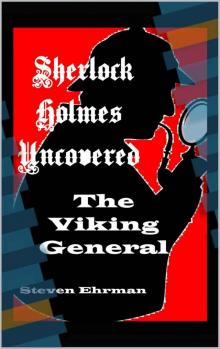 The Viking General (A Sherlock Holmes Uncovered Tale Book 9)
The Viking General (A Sherlock Holmes Uncovered Tale Book 9)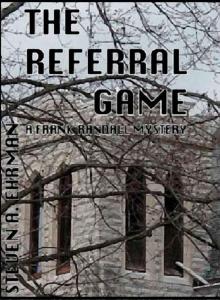 The Referral Game (A Frank Randall Mystery)
The Referral Game (A Frank Randall Mystery) Collection of Four Short Stories
Collection of Four Short Stories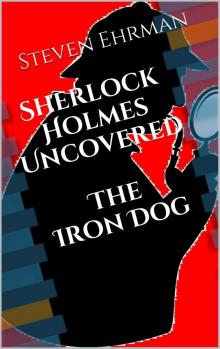 The Iron Dog (A Sherlock Holmes Uncovered Tale)
The Iron Dog (A Sherlock Holmes Uncovered Tale)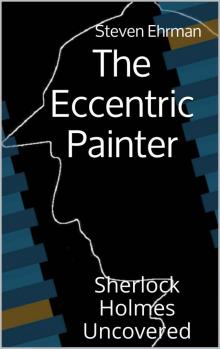 The Eccentric Painter (A Sherlock Holmes Uncovered Tale)
The Eccentric Painter (A Sherlock Holmes Uncovered Tale) The Mad Judge (A Sherlock Holmes Uncovered Tale Book 3)
The Mad Judge (A Sherlock Holmes Uncovered Tale Book 3)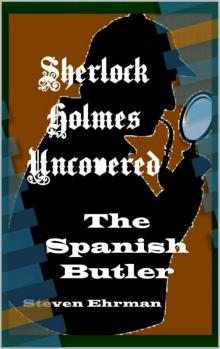 The Spanish Butler (A Sherlock Holmes Uncovered Tale Book 8)
The Spanish Butler (A Sherlock Holmes Uncovered Tale Book 8)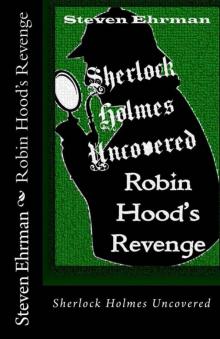 Robin Hood's Revenge (A Sherlock Holmes Uncovered Tale Book 7)
Robin Hood's Revenge (A Sherlock Holmes Uncovered Tale Book 7)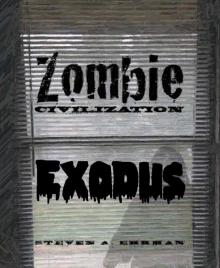 Zombie Civilization: Exodus (Zombie Civilization Saga Book 2)
Zombie Civilization: Exodus (Zombie Civilization Saga Book 2)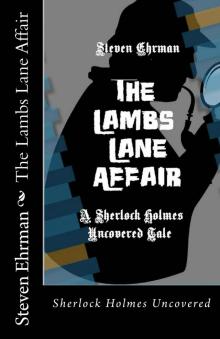 The Lambs Lane Affair (A Sherlock Holmes Uncovered Tale Book 5)
The Lambs Lane Affair (A Sherlock Holmes Uncovered Tale Book 5) Zombie Civilization: Genesis (Zombie Civilization Saga)
Zombie Civilization: Genesis (Zombie Civilization Saga)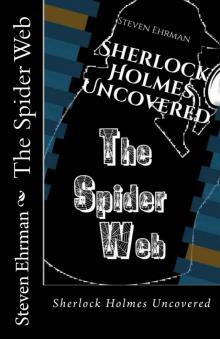 The Spider Web (A Sherlock Holmes Uncovered Tale Book 4)
The Spider Web (A Sherlock Holmes Uncovered Tale Book 4)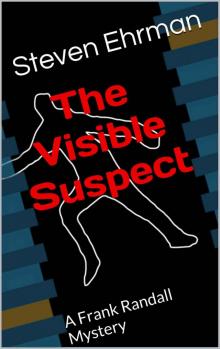 The Visible Suspect (A Frank Randall Mystery)
The Visible Suspect (A Frank Randall Mystery)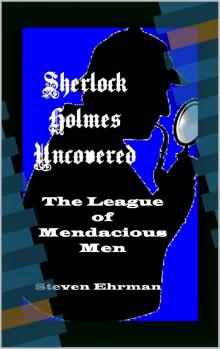 The League of Mendacious Men (A Sherlock Holmes Uncovered Tale Book 10)
The League of Mendacious Men (A Sherlock Holmes Uncovered Tale Book 10)